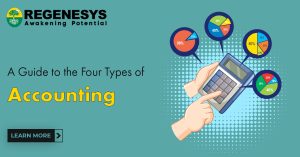The accounting domain encompasses various types, each serving a unique purpose in managing financial information and aiding decision-making. Understanding the different types of accounting is essential for individuals and businesses alike.
In this article, we will explore the 4 main types of accounting and their significance in the financial world.
Table of Contents
What Is Accounting?
Accounting is the methodology of maintaining and analysing financial records and transactions of an enterprise or individual. It involves recording, summarising, interpreting, and communicating financial information to help businesses make informed decisions and meet legal requirements.
Accounting includes documenting financial transactions, drafting financial statements (such as balance sheets, cash flow statements and income statements), analysing financial data, monitoring and controlling budgets, maintaining conformity with tax rules and regulations, and providing financial advice to management.
Accounting provides a comprehensive view of a business’s financial health and performance, enabling stakeholders to assess the organisation’s profitability, liquidity, and solvency.
What are the 4 Types of Accounting?
There are several types of accounting, and each type of accounting serves different purposes and caters to different needs of businesses and individuals. The 4 common types of accounting are:
-
Financial Accounting:
- Financial accounting is the most widely known and practised type of accounting. It focuses on generating financial statements that provide a snapshot of a company’s financial position.
- These financial statements include statements of cash flow, statements of balances, and income statements, which showcase the company’s investments, penalties, earnings, and expenditures.
- Financial accounting aims to deliver precise and transparent financial details to external stakeholders, such as creditors, investors, and regulatory authorities.
- Financial accountants ensure that the information presented is reliable and comparable across different companies by adhering to specific accounting principles, such as Generally Accepted Accounting Principles (GAAP).
-
Management Accounting:
- Management accounting, or managerial accounting, is geared towards aiding internal decision-making within an organisation.
- Unlike financial accounting, which focuses on historical data, management accounting delivers accessible and timely information to managers for preparing, controlling, and evaluating business operations.
- Management accountants analyse data and generate reports that help managers make informed decisions regarding budgeting, pricing, cost control, and performance evaluation. These reports can include variance analysis, break-even analysis, and profitability analysis.
- By providing insights into the financial aspects of various business activities, management accounting helps drive operational efficiency and strategic decision-making.
-
Tax Accounting:
- Tax accounting assists in the preparation of filing tax returns for individuals and businesses, ensuring compliance with applicable tax laws and regulations.
- Tax accountants are responsible for calculating tax liabilities, claiming deductions and credits, and preparing the necessary documentation for tax authorities.
- Tax accountants must stay updated with the ever-changing tax laws to help clients minimise tax obligations while remaining compliant. They provide tax planning advice, identify tax-saving opportunities, and assist with tax audits or disputes.
- With tax regulations becoming increasingly complex, tax accounting professionals are in high demand to ensure accurate and efficient tax reporting.
-
Auditing:
- Auditing is essential in maintaining financial information’s integrity and instilling stakeholders’ confidence. It ensures that companies operate ethically, safeguard assets, and meet regulatory requirements. Auditing examines and evaluates financial documents, transactions, and procedures to confirm efficacy, reliability, and adherence to applicable rules and regulations.
- Internal and external auditors provide an independent and objective assessment of an organisation’s financial statements and internal controls.
- Companies typically hire external auditors to review their financial records independently. Their primary goal is to express an opinion on the fairness and accuracy of the company’s financial statements.
- On the other hand, internal auditors work within an organisation to evaluate internal controls, identify risks, and recommend improvements to enhance operational efficiency and minimise fraud or errors.
These are just a few examples of the various types of accounting, and many accountants specialise in one or more domains based on their expertise and clients’ needs.
The Bottom Line
Accounting encompasses various types that serve different purposes. Financial accounting delivers external stakeholders with valid and transparent financial information, while management accounting aids internal decision-making. Tax accounting ensures compliance with tax laws and helps clients minimise tax obligations. Lastly, auditing verifies the accuracy and reliability of financial records and assures stakeholders. Understanding these four types of accounting is essential for individuals and businesses to manage their financial affairs and make informed decisions effectively.
Get to know more about these 4 types of accounting with Regenesys Business School. The Regenesys’ BCOMPT programme is a stepping stone on a learning journey towards becoming a professional accountant.
Enrol now at Regenesys’ Bachelor of Accounting Science (BCOMPT) and develop your professional knowledge, skills, and applied competencies in accounting, auditing, management accounting and taxation. Click here to learn more in detail about the bachelor of accounting science course details, accounting science requirements, accounting science jobs and more in detail about the accounting science Regenesys modules.
FAQs – Frequently Asked Questions on What Are The 4 Types of Accounting?
What is Accounting?
Answer:
Accounting is the process of maintaining and analysing financial records and transactions of a business. Accounting plays a crucial role in the financial management of any business. It helps track and record financial transactions, analyse data, and prepare financial statements.
What do managerial accounting reports consist of?
Answer:
The managerial accounting reports include budgeting, variance analysis, cost-volume-profit analysis, and performance evaluation.
What is cost accounting?
Answer:
Cost accounting is a type of accounting which involves analysing, tracking, and controlling costs associated with manufacturing products or providing services. Cost accountants are mainly involved in identifying, measuring, and assigning costs to products and services to make informed pricing decisions, optimise expenses, and improve profitability.
What are the different types of auditing?
Answer:
The three types of auditing are – IRS Audit, Internal Audit and External Audit.
These different types of auditing serve different purposes and cater to the different needs of businesses and individuals.
What are the different types of accounting?
Answer:
There are several types of accounting which focus on different aspects of business. Some focus on costs, others on audits, and some focus on taxes. Some of the common types of accounting include:
Auditing;
Tax Accounting;
Cost Accounting;
Forensic Accounting;
Financial Accounting;
Managerial Accounting.







